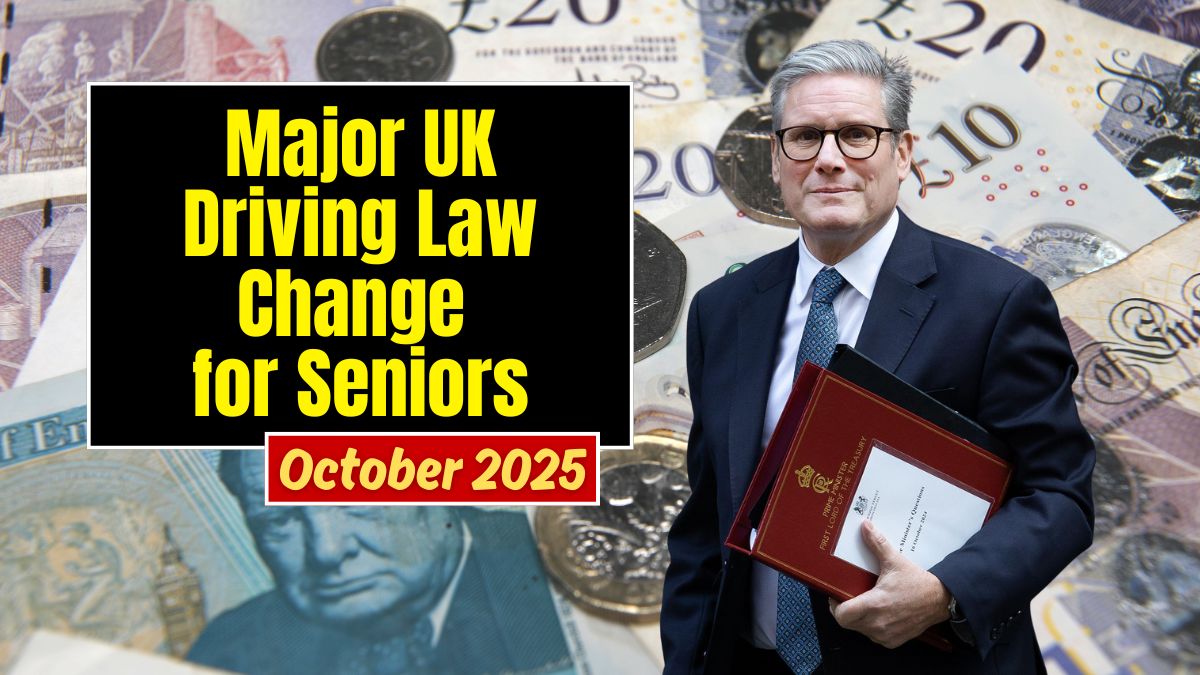From 1 October 2025, the UK will introduce pivotal changes in driving licence renewal rules for senior motorists.
Individuals aged 70 and over must now undergo a mandatory medical examination before renewing their licence, replacing the previous self-declaration process.
With more than 5.7 million drivers in this age group, the reform represents one of the most substantial shifts in recent years — aimed at bolstering road safety while preserving the mobility of capable older drivers.
Key Information at a Glance
| Aspect | Details |
|---|---|
| Effective Date | 1 October 2025 |
| Who Is Affected | Drivers aged 70+ |
| Core Requirement | Compulsory medical assessment prior to licence renewal |
| Components of Tests | Vision, cognitive assessment, general health check |
| Submission Channels | Online via DVLA portal or by postal mail |
| Possible DVLA Decisions | Full renewal (3 years), restricted licence, further medical/road tests |
This new system replaces the earlier self-certification method. The goal: to detect potential health risks early, and to allow those who remain fit to continue driving safely.
Why the Change? Risks & Rationale
Although the majority of senior drivers are cautious and competent, ageing can gradually impair key driving capacities. Diminished vision, slower reaction time, or lapses in memory may elevate accident risk.
Previously, drivers over 70 simply self-declared their fitness to drive — a process the authorities now view as insufficiently rigorous. The newly mandated medical assessments aim to provide a more objective safeguard for both older drivers and other road users.
Step-by-Step Renewal Process for Drivers Aged 70+
1. Renewal Notification from DVLA
Approximately 90 days before licence expiry, the DVLA will send a reminder to prompt the renewal process.
2. Scheduling the Medical Examination
Drivers must arrange a health check with either their GP or an accredited medical examiner. The assessment will encompass:
- Vision test: Visual acuity, peripheral vision, and depth perception
- Cognitive evaluation: Concentration, reflexes, memory, and decision-making
- General health review: Medications, chronic conditions, overall fitness related to driving
3. Submitting the Medical Report
A certified physician will fill out the official D4 medical form. The completed form can be delivered:
- Online through the DVLA’s web portal, or
- By post directly to DVLA offices
4. DVLA Review and Decision
Upon reviewing the medical findings, the DVLA may:
- Grant a standard 3-year renewal,
- Issue a restricted licence (e.g. daytime-only driving),
- Request further evaluation, such as specialist medical tests or an on-road driving assessment.
Health Conditions Under DVLA Scrutiny
The DVLA will pay close attention to conditions that could impair driving competency, including:
- Dementia or memory disorders: May undermine focus, judgment
- Cataracts, glaucoma: Can reduce vision clarity and depth perception
- Heart disease: Risk of sudden incapacitation
- Stroke recovery: May limit coordination, response
- Parkinson’s disease: Slowed reflexes or muscle control
Importantly, the presence of one of these conditions does not automatically lead to disqualification. Each applicant is evaluated on a case-by-case basis, drawing on expert medical advice to ensure fairness and safety.
What Happens if Renewal Is Denied or Restricted?
A negative medical verdict doesn’t always mean permanent revocation. Possible outcomes include:
- Short-term licences: Valid for 1–2 years with ongoing review
- Restricted licences: Limiting driving to certain times (e.g. daytime) or areas
- Later reapplication: If health improves following treatment or rehabilitation
Only in extreme cases — where medical experts conclude a serious safety hazard exists — will a licence be permanently revoked.
How Seniors Can Prepare Ahead
To smooth the renewal process, drivers aged 70+ can take proactive steps:
- Undergo regular eye checks and update eyewear prescriptions as needed
- Maintain well-organized medical records and share relevant details during the assessment
- Respond promptly to DVLA reminders so their licence never lapses
- Begin family conversations if health difficulties seem to encroach on driving ability
Such preparation helps older drivers retain their independence while satisfying the new regulatory requirements.
Broader Implications
The UK government’s intention is not to penalize older drivers, but rather to balance road safety with personal freedom. Driving remains a vital link to community, family, and daily independence for many seniors.
With this new framework, medical checks are introduced to proactively support safe driving—without unduly eroding mobility for those who are physically and mentally fit.
Starting 1 October 2025, senior drivers in the UK (aged 70+) must pass a mandatory medical examination before renewing their driving licence. This replaces the prior self-certification system and aims to detect health risks early while preserving safe driving rights.
The process involves vision, cognitive, and health checks; submission via DVLA; and outcomes that range from full renewal to restricted or conditional licences.
By preparing in advance—through regular health monitoring and timely responses to DVLA notices—older drivers can maximize their chances of a smooth licence renewal and maintain independence on the road.
FAQs
Does having a health condition automatically disqualify me from renewing my licence?
No — the DVLA evaluates each case individually. A medical condition does not automatically mean disqualification; decisions consider severity, treatment, and risk.
Can I appeal or request another assessment if my renewal is refused?
Yes — if the DVLA declines renewal, drivers may later reapply when their health improves or undergo further tests to support their case.
How soon should I start preparing for the medical exam?
You should begin several months before the licence expiry—scheduling eye tests, updating medications, and maintaining medical documentation ahead of the DVLA reminder.

